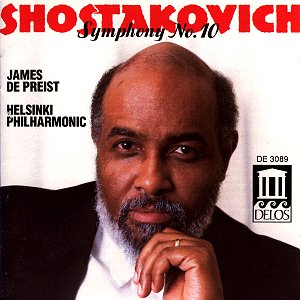Two works from the year after Stalin's death.
The overture is picaresque, restless and sparkling
and not terribly subtle (Shostakovich adds a full brass band for good
measure); everything it was meant to be. It is a Soviet equivalent of
Bernstein's Candide Overture. Closer to home it relates to Kabalevsky's
Colas Breugnon and, no doubt, a whole unknown phalanx of other
Soviet concert overtures. Its darting and dissolute energy refers forward
to the dashing wind writing in the Second Piano Concerto.
Contrast the overture with the symphony. We exchange
virtuosic clowning and showmanship for a scorching and grim work where
victory is pyrrhic, annealed with fire and ice, seared with acid and
laced with tragic loss. There is some playfulness but it is of a macabre
sort - hop-scotch in the graveyard rather than in sunny highlands.
Just as with DePreist's rightly praised recording of
the Eleventh this recording is a good one. I liked the steady-sturdy
pacing although I could have done with more from the sub-stratum of
hysteria. Tension is well put across. The weight of the string sound
is questionable and this surely has more to do with the Helsinki numbers.
If you compare a more 'primitive' recording such as CBS-Sony's of the
Fourth Symphony (Philadelphia/Ormandy) you will see what I mean. The
Leningraders under Mravinsky are much closer to the hazardous crux -
try virtually any of their various recordings. The ones on BMG-Melodiya
or Praga are good examples. Amelia Haygood's team struck a naturalistic
balance rather than grabbing for dramatic effect. I am not sure that
this is quite the classic version claimed by some but it is good.
DePreist, a conductor of patent integrity, directs
fine versions of these works. He is recorded in natural sound. His part
cycle of the Shostakovich symphonies can be heard across two labels:
Finlandia and Ondine.
Rob Barnett

